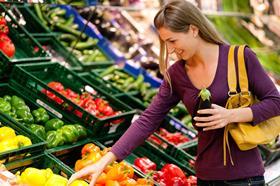
Households should be given vouchers to buy British fresh produce when EU subsidies are withdrawn after Brexit, according to a new report.
The thinktank Policy Network recommended that the government introduce ‘Apple’ vouchers to ensure demand for British farmers’ produce, while also helping low-income families afford basic necessities.
“Instead of subsidising farmers directly to produce or simply for owning or controlling land, the government could put those resources into the hands of consumers instead,” wrote Charlie Cadywould, author of the report, The Future of Farming.
He argued this would guarantee “the continuation of the sector, the survival of rural communities dependent on agriculture, and long- term food security, without compromising on productivity, artificially inflating land values, or raising food prices.”
Cadywould recommended that the value of the voucher could be somewhere in the region of £200 per year, replacing the amount the UK currently contributes to direct payments under Pillar I of the Common Agricultural Policy.
However, he said the vouchers’ value could rise over time since £200 is only around seven per cent of average household annual spending on food: £2,714.
Cadywould insisted the aim of the proposal would not be to discourage the consumption of imported food, but rather to give the agricultural sector “a basic degree of certainty that there will be demand for its produce”.
The thinktank said the scheme should operate as well as, not instead of, environmental or public good incentives, as outlined in the report and touted in the government’s 30-year plan for the environment.
The voucher scheme would mean some less productive farmers would go out of business if they were unable to compete “without the cushion of subsidies,” Cadywould conceded, stressing that “environmental and public good incentives will need to be sufficient to help valued low-intensity farms.”
He suggested limiting the scheme to fresh, unprocessed food to avoid complications with defining ‘British produce’ – a danger if things like ready meals or sauces were included.
The voucher scheme was one of three approaches outlined in Policy Network’s report to support the agricultural sector in the event of Brexit.
The other ‘hybrid’ strategies include ‘supercharged environmentalism’, whereby all subsidies are routed through incentives for responsible environmental and business practices. A similar approach is supported by Defra Secretary Michael Gove.
Alternatively, farmers’ subsidies could be based on revenues from agriculture, thus linking payments to the market and “escaping the inefficiencies of area-based payments”, the thinktank suggested.



